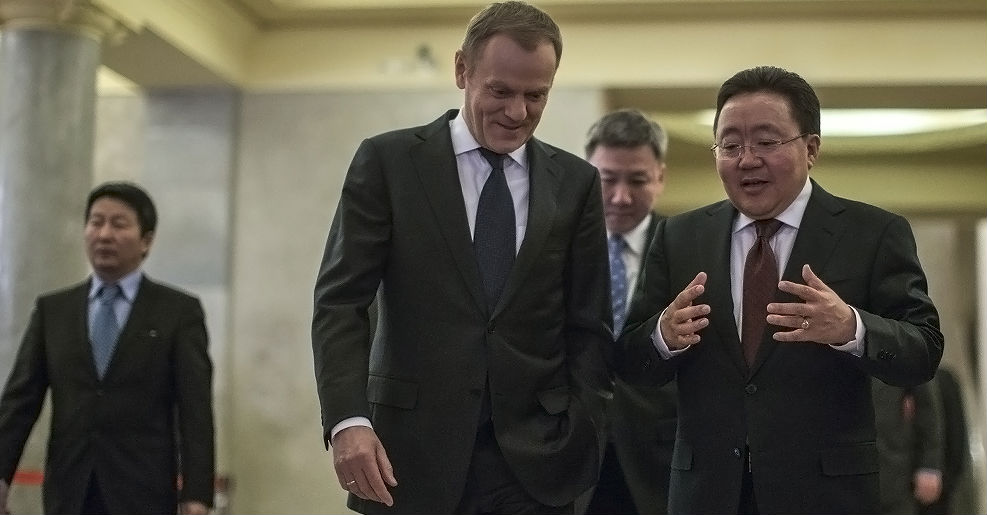The Peninsula
Could Mongolia Serve as a Mediator with North Korea?

By Troy Stangarone
As the only Northeast Asian nation not involved in the nuclear talks with North Korea, Mongolia is often left out of discussions about resolving the region’s most intractable security issue – the North Korean nuclear crisis. However, when Mongolian President Tsakhiagiin Elbegdorj becomes the first head of state to meet with Kim Jong-un on his current trip to Pyongyang in commemoration of 65 years of ties between the two nations, he hopes to play a constructive role in moving North Korea towards a more peaceful path.
At first glance, Mongolia may seem an unlikely mediator for dealing with North Korea. China has played the most significant role in mediating disputes between North Korea and its neighbors, while North Korea has sought to have direct conversations with the United States regarding its nuclear program. But since signing a friendship treaty to reestablish ties in 2002 after a brief interlude as Mongolia transitioned to democracy, Ulaanbaatar has utilized backchannel diplomacy to engage North Korea.
One of the primary ways Mongolia has sought to engage North Korea is by presenting itself as an example of a country that was able to make economic reforms peacefully while balancing its powerful neighbors. Much like Mongolia, which has become a boom market thanks to its mineral wealth, North Korea possesses substantial mineral deposits. Mongolia has offered this as one path for North Korea to develop its economy while retaining its sovereignty. However, Mongolia’s economic boom also led to a transition to a democratic government, something which has long been a concern of the leadership in Pyongyang if it were to engage in economic reforms.
In the years since reestablishing ties, North Korea and Mongolia have signed a series of agreements related to science and technology, agriculture, trade, infrastructure, and other fields. Business ties are growing as well. Currently, there are 1,700 North Koreans working in Mongolia and President Elbegdorj is supportive of raising that number as well as engaging in joint economic projects, such as a Mongolian firm taking a 20 percent stake in an oil refinery in North Korea. At the height of tensions earlier this year with South Korea, North Korea felt close enough in its ties to Mongolia to reach out for food aid.
As one of the few countries with good relations with both North and South Korea, this may place Mongolia in a position to play a mediating role. While the West and North Korea both have complicated relationships with China, Mongolia is on relatively good terms with all of the parties involved and in some cases may be an easier route for exchanging information. Additionally, unlike the other parties involved, Mongolia does not have the complex history with North Korea of other states in the region and does not present a potential security threat to Pyongyang.
However, in recent years Mongolia has served as conduit for discussion with North Korea. Mongolia has offered to serve as a host for meetings between North Korea and other officials. In 2012, Mongolia hosted Japanese and North Korean officials as the two sides sought to resolve differences over the issue of Japanese citizens abducted by North Korea. President Elbegdorj discussed this issue earlier this year in his meetings with Japanese Prime Minister Abe and may raise the issue with Kim Jong-un.
In 2009, North Korea reached out through Mongolia to let the United States know that while it would not return to the Six Party Talks, it was interested in meeting one-on-one with the United States dismantling its nuclear program and normalizing relations.
While Mongolia is unlikely to supplant the role China has played, it could find a role as a facilitator and neutral intermediary in helping to resolve tensions in Northeast Asia. One of the issues that blocked a resolution to the Six Party Talks was the abduction issue. If Mongolia were able to help to facilitate discussion and agreement on discreet issues such as this, it could play an important role in helping to maintain peace and stability in Northeast Asia.
Troy Stangarone is Senior Director for Congressional Affairs and Trade for the Korea Economic Institute. The views expressed here are his own.
Photo from Kancelaria Premiera’s photostream on flickr Creative Commons.
